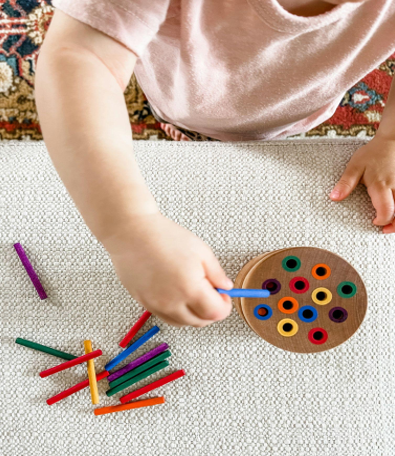Playtime during the early childhood years is not a simple leisure activity. It is the very definition of how toddlers learn, grow, and connect with the world around them. Among all the many educational techniques that depend on play as a tool for learning, the Montessori method stands out due to its emphasis on independence, hands-on experience, and purposeful materials.
Montessori toys, also referred to as Montessori materials in school settings, are not conventional playthings. While they look like ordinary toys, these carefully crafted tools are designed to help children build vital skills through purposeful play. Their simplicity and design offer toddlers significant opportunities to develop motor skills, language, focus, and problem-solving skills. All of these within the framework of play.
What Makes Montessori Toys Different?
Montessori toys are rooted in the education philosophy of Dr. Maria Montessori, which promotes child-directed learning within a carefully prepared environment. One at a time, each toy addresses one concept, is constructed from natural materials, and is usually self-correcting. This allows a child to identify and correct their own errors, promoting independence and critical thinking.
Unlike most modern toys filled with lights and sounds, Montessori materials are intentionally simple in nature. This is a silent methodology that allows toddlers to focus, discover, and learn at their own pace without distraction through overstimulation.
Fine Motor Skills: The Foundation of Independence
Montessori toys are excellent for developing fine motor skills for toddlers. Simple pieces of equipment like a stacking block, threading beads, or wood puzzles are excellent for children to develop the muscles in their hands, coordination, and control. These rudimentary skills are the foundation for more complex activities later like holding a pencil, buttoning a shirt, or tying shoelaces.
With practice, toddlers become secure in the utilitarian use of their hands. This provides a basis for even more advanced actions with age.
Focus and Concentration: Learning to Stay Engaged
Maybe the biggest overlooked benefit of Montessori play is how it promotes staying focus. Because the toys segment a single skill or concept, kids have an incentive to work on something for more than they would with more distracting toys. They can learn to build up their attention span, patience, and ability to work independently; which are all key skills for school and beyond.
For instance, a child who methodically piles nesting cups or completes a matching game is learning an idea but also reinforcing the self-discipline of staying on task until its completion.
Language and Communication: Learning Through Interaction
Montessori toys are also used to facilitate early language development. Activities that involve naming objects, sorting items by type, and mere following of instructions help associate words with actions in toddlers. As the caregiver gets involved by labeling what the child is doing or answering open-ended questions, the child's vocabulary increases naturally.
For instance, the use of animal figures in sorting games allows children to learn animal names, colors, and habitats as memory and classification are exercised.
Cognitive Development: Building Logical Thinking
Montessori play provides toddlers with an opportunity to think logically and figure things out. Whether they're trying to place a shape in the correct hole or mastering how to balance blocks, they are challenging their minds as well as their hands.
They possess an intrinsic control of error, which allows toddlers to experiment and find out what works without adults having to correct them. Trial-and-error leading to successful accomplishment fosters persistence, resilience, and a sense of achievement.
Emotional and Social Development: Learning Beyond Academics
Foundation skills are more than book learning. Montessori toys also serve to build emotional intelligence and social awareness in toddlers. Most toys reinforce the idea of daily tasks like pouring water, sweeping, or folding. Toddlers become self-assured when they are able to practice these activities and feel that they are able to contribute to their environment.
This also translates into higher social skills. A child who learns to work patiently, to clean up after themselves, and to work with others is building the kind of emotional maturity that will last them a lifetime.
A Balanced Approach: The Power of Purposeful Play
While play of any kind is positive, not all that is enjoyable is of equal value. Montessori materials are specially designed to ensure learning and enjoyment are parallel paths. They allow children to investigate concepts in depth without incessant adult direction or device stimulation.
Parents and caregivers who present such materials are giving their toddlers more than entertainment. They are giving them tools that nurture development in every area of development — physical, cognitive, emotional, and social.
Tips for Choosing Montessori Toys for Toddlers
Select toys that are crafted from natural materials like wood, fabric, or metal. These offer more sensory feedback than plastic.
Choose materials that focus on one skill at a time. A shape-recognizing puzzle, for example, rather than one with too much color, sound, and light.
Make sure the toys are developmentally appropriate. Young toddlers like simple cause-and-effect toys, but older toddlers can handle more complex sorting or matching.
Put the toys away in a neat, organized space. This encourages independence and lets children establish routines.
Final Thoughts
The toddler years are years of serious development and exploration. Given the proper environment and the proper materials, young children can thrive in ways that promote long-term skills. Montessori toys are more than just objects to keep toddlers busy. They are interactive, educational, and designed to enable young children to build the skills they will use for a lifetime.
For parents who wish to contribute to their child's growth through meaningful play, a good starting point is to look at Montessori toys. These materials offer a well-balanced, thoughtful approach that honors a child's natural curiosity and stimulates independence, concentration, and growth.



